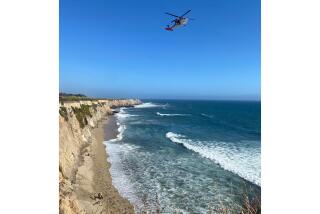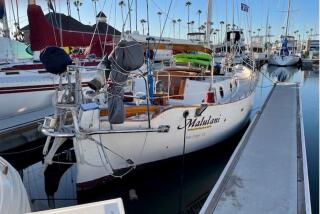Rescue expected this morning for Newport circumnavigator
- Share via
After a three-day race to rescue a badly injured Newport Beach sailor stranded in the storm-whipped Pacific, a fishing trawler was expected to pluck Ken Barnes Jr. this morning from his crippled sailboat near the tip of South America.
As a worldwide audience followed the rescue operation, attempts to reach the 44-foot ketch have been repeatedly thwarted by fierce weather off the coast of Chile. On Tuesday, brutal winds and monster waves near Cape Horn had snapped the two masts off Barnes’ sailboat, Privateer. The stormy sea also swamped the boat’s cabin, killing the electrical system, wrecking the engine and halting a solo around-the-world voyage launched in October from Long Beach Harbor.
The closest fishing boat, the 200-foot Polar Pesca 1, was scheduled to reach Barnes today between 2 and 5 a.m. Pacific time -- more than 12 hours after his family was told the rescue would occur. The family had blamed the mix-up on miscommunication, but the Chilean newspaper El Mercurio reported that officials had miscalculated how long it would take for boats to punch through the rough weather.
The rescue of Barnes, 47, would cap a frenzied search that sent the Chilean navy, a fishing trawler, a cargo ship and another solo sailor racing to waters that officials had described to his girlfriend as a “graveyard of boats.”
With Barnes’ emergency beacon running out of batteries, Chilean officials are planning to have military planes circle his boat, about 500 miles west of the coast, until the fishing trawler arrives. It will then take about two more days for the fishing boat to reach port in Punta Arenas, Chile.
“The wave of emotion continues to ride like the storm Ken is in,” said Barnes’ sister Beverly Smith.
In satellite phone calls to family and friends, Barnes said he had put on a survival suit in the near-freezing temperatures and deployed a sea anchor, which resembles an underwater parachute, to slow the boat’s drift.
Ron Vangell, a longtime friend of the sailor, told a disoriented Barnes on Thursday afternoon to sleep until he heard plane engines. Then he was to turn on his satellite phone, which also was running low on battery power. Vangell, who runs a website chronicling Barnes’ journey (www.kensolo.com), said Barnes’ leg had been sliced to the bone days ago and was still bleeding.
A photo taken Thursday from a Chilean military plane and posted on Vangell’s site showed Barnes’ boat with its sails crumpled and its deck asunder.
The rescue operation’s fits and starts kept Barnes’ family and friends on edge Thursday as they huddled in his Newport Beach town home and answered calls from reporters.
“My stomach is in knots, I haven’t been sleeping. I finally ate a little this morning. It has been very difficult,” said Barnes’ girlfriend, Cathy Chambers, as she tried to pass time reading news reports about Barnes’ plight.
“I’m scared for him,” said Smith, who lives in Tehachapi. “The thought of him being out there, cold and wet and scared -- I don’t like that at all.”
Barnes, whom his family calls “Keb,” learned to sail in Long Beach’s Alamitos Bay. He decided a dozen years ago to set sail on a solo voyage around the world in 2006. He waited until his twin daughters and son, who is stationed with the Navy in Spain, had finished their educations.
Barnes picked Oct. 28 to begin the journey because the date would give him the best shot at clearing Cape Horn, said his father, Ken, who called the voyage a “horrible risk.”
“Cape Horn is where they turn men into boys,” the elder Barnes said. “A lot of sailors are buried there.”
The search for Barnes was triggered Tuesday afternoon when he turned on his boat’s emergency satellite beacon. He also made a panicked call on his satellite phone to his girlfriend in Newport Beach, telling her that he was in trouble.
On Wednesday, a Chilean military plane spotted the sailor, who waved from the deck. A survival package was dropped to the sea but never reached him. While Barnes awaited rescue, he told Chambers he had been eating only Pop-Tarts and granola bars. Much of his food, although still on the boat, was underwater.
Michael Morales, a native of Chile and a ham radio operator in Riverside, became a lifeline for Barnes’ family. The retired customs officer monitored messages from Chilean officials and boats in the area, then updated Chambers on a rescue plan that seemed to change by the minute.
“I think about if I had one of my sons stranded in that kind of situation, what would I do? I think I would like to have a guy like me, getting information,” Morales said through tears.
One vessel racing to the rescue, a Chilean naval tugboat, had no helicopter aboard, as first believed by Barnes’ family, dashing prospects that it could yank the sailor from waters where another storm was brewing. About 150 nautical miles west of Barnes, another solo circumnavigator, Donna Lange, turned her boat into the bad weather and joined the search.
“I am just praying,” Lange wrote on her website (www.donnalange.com). “I am putting a log into the website for everyone to pray he is found. There is another very large storm system coming through in just a few days and it will beat him up hard if he is not off that boat.”
Morales, who spent Wednesday night working the ham radio with two friends, connected with the Polar Pesca 1 at 4:25 a.m. Thursday. He explained that he was a link to Barnes’ family.
Yes, the crew said, we’re on our way.
Yes, we’re getting closer.
Yes, we have a doctor on board, and Barnes will get a medical exam and a hot meal.
Chambers kept her own vigil, not expecting another call because the batteries in Barnes’ phone were dwindling. At 8:17 a.m. Thursday, her phone rang. Barnes told her that he had spent the night in a red survival suit that resembled a Pillsbury Doughboy costume.
He asked whether a helicopter was en route; not wanting to disappoint him, Chambers lied and said yes.
“We told each other that we loved each other,” she said. “That’s another reason for hope.”
ashley.powers@latimes.com
sara.lin@latimes.com
*
Times staff writers Jennifer Delson, David Haldane and Ashraf Khalil contributed to this report.
*
(BEGIN TEXT OF INFOBOX)
The dangers of Cape Horn
--
Ken Barnes Jr., who was about 500 miles off the Chilean coast when he sent a distress signal Tuesday, was en route to Cape Horn, an area prone to high waves, violent gusts of cold wind -- called williwaws -- that blast off the mountainous coast, and hull-scraping icebergs that migrate from the Antarctic Circle. Rescuers hoped to reach Barnes on his boat, Privateer, early today.
More to Read
Sign up for Essential California
The most important California stories and recommendations in your inbox every morning.
You may occasionally receive promotional content from the Los Angeles Times.














